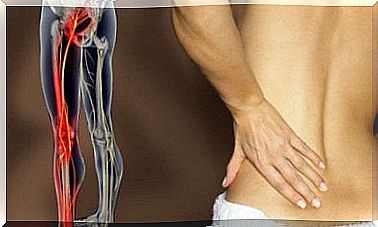8 Signs That Indicate A Sick Gut
Although we do not make the connection, some rashes such as acne or other allergic reactions that appear on the skin may be due to a gut intoxicated who is not able to purify himself.

Disorders of the intestines usually trigger a series of digestive symptoms that can interrupt our daily life by making us sick. Find out what are the signs that indicate a diseased gut.
It is common to experience abdominal pain, inflammation, and other stomach ailments. Indeed, these can be recurrent depending on the factor that causes them.
However, since gut health interferes with processes such as the segregation of certain hormones and immune health, it is common for these diseases to manifest themselves through reactions in other systems of the body as well.
For this reason, it is common for people to confuse their health problems with certain pathologies, unaware that in reality the problem arises from the alterations in this organ.
For this reason, as such, we want to share with you in this article the 8 signs that, although they may be due to other factors, in general signal a diseased gut.
1. Anxiety and depression

It is quite strange to associate the functioning of the gut with emotions. But, contrary to what one might think, they are closely related.
This organ produces about 70% of the body’s serotonin. It is, so to speak, the neurotransmitter linked to happiness and well-being.
The decrease in this substance causes a bad mood. It also affects physiological functions such as digestion.
2. High glucose levels
Pre-diabetes and diabetes are chronic disorders resulting from the excessive build-up of sugar in the blood.
These conditions can result from intestinal dysfunction. This is because the bacteria that live in the system can deteriorate and cause difficulties in the metabolic processes that convert glucose into sources of energy.
3. Skin diseases, a sign of a sick intestine

Skin rashes, such as those produced by acne as well as disorders such as eczema can suggest difficulty in the bowel. In particular because of alterations in the activity of the bacteria that colonize it.
For example, a disorder known as a leaky gut, characterized by difficulty in digesting certain food particles, triggers an inflammatory response which, most of the time, is evident on the skin.
4. Digestive problems
Abdominal inflammation, gas and diarrhea are obvious signs of a strong change in the bacterial flora that protects the intestine.
Although these are symptoms that arise from various stomach diseases, their origin may be due to an intestinal disorder.
This can be caused by the excessive accumulation of waste. In addition to the difficulties of digestion of certain foods.
5. Bad breath

Halitosis, which we all know as bad breath, can result from a microbial imbalance in a diseased gut.
Although these changes cause reactions in the stomach, many of them are carried to other parts of the body, including the mouth.
We can identify it when, for example, despite the use of mouthwashes and external remedies, the bad smell does not go away.
6. Difficulty sleeping
Sleep problems alert you to an imbalance in chemicals secreted by the brain to sleep.
One of them is serotonin. It is a neurotransmitter which, as we have already mentioned, is produced largely in the intestine.
When its levels drop, or are no longer normal, it is common to experience insomnia and sleep interruptions during the period of rest.
7. The desire to eat sugar

The imbalances that bacteria suffer from the habitual consumption of sugars and sweets, can result in the insatiable desire to continue consuming these types of foods.
Bacteria adapt to this substance for their sustenance. So when their levels start to drop, they demand more of the brain.
Therefore, the desire to eat these foods in greater quantities is felt. In the medium and long term, this leads to excess weight.
8. Food intolerances
Food intolerances, such as the consumption of lactose or gluten, are the consequence of the difficulties that the intestine encounters in fully digesting this type of substance.
It is a condition known as Leaky Bowel Syndrome. By preventing the decomposition of food, it causes an inflammatory reaction. This affects both digestion and the immune system.
Identifying these problems is essential, as their lack of treatment can lead to more complicated illnesses.
In conclusion, while it is sometimes normal to experience digestive discomfort, a diseased gut can also affect emotional, skin, and metabolic health.
It is therefore essential to consult your doctor if you have any doubts. Especially if the symptoms persist or appear recurrently.









